Have you noticed that your dog’s jaw sometimes quivers?
Does he seem to exhibit this behavior only in certain situations or at particular times?
Or does it happen only when specific factors are present?
If you have noticed this shivering and shaking conduct in your pet, the last thing you’ll want to do is panic.
In most cases, there is a perfectly normal and harmless reason for a dog’s quivering bottom jaw; and usually, no action whatsoever is needed on your part.
There are some fairly rare circumstances, however, where bottom jaw quivering may be more serious than you first thought.
In these cases, there may be one or more medical conditions to blame for this type of shaking, and each of these underlying medical causes should be made known to your vet, as most are treatable if caught early enough.
In the following article we have listed some of the possible reasons for a quivering bottom jaw in our canine best friends.
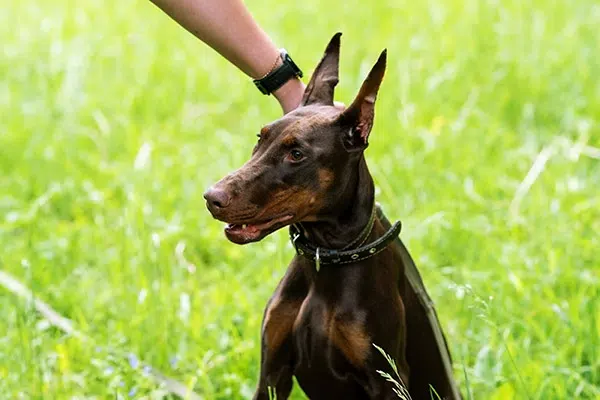
We have divided these potential causes into two general categories: behavioral/environmental causes and medical causes, the latter of which being caused by a “specific” disease, illness or injury.
For each cause, we have also included a sentence or two on how should you address it—or on why that particular cause deserves no attention at all.
Reasons for a Dog’s Quivering Bottom Jaw—And What You Should Do about It
Picture this: Your dog is sitting patiently just below the hook on which his leash his hung.
He is hoping (and maybe praying) that the very last sentence you uttered— “Wanna go for a walk”—will actually come to fruition.
As you arise from the sofa, your pooch is watching you very closely and his excitement is becoming palpable.
Then, as you approach your dog and the wall holding the leash hook, you look over at your pet and notice that his jaw has begun to quiver, as if he found a spot in the room where the air is freezing cold.
Given these circumstances, should you really be worried about your dog’s quivering jaw?
Probably not, right?
The most likely explanation for the shaking in this scenario is “restrained excitement” at the thought of finally be hooked up to that leash; and the thought of this golden opportunity to explore the world.
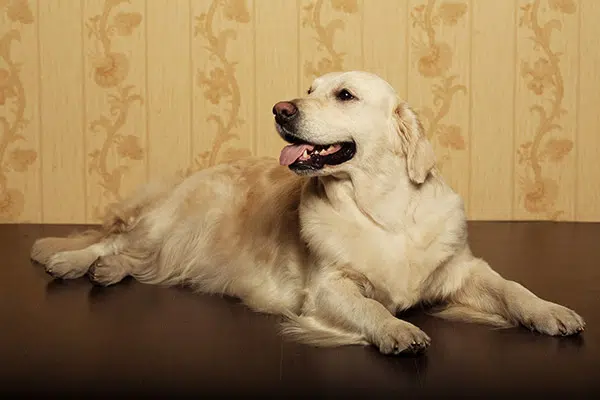
As you can see from this not-so-elegant example, not all cases of jaw quivering merit immediate concern, and if it only happens in certain circumstances—like waiting to go for a walk—there is no cause for concern whatsoever.
This does not mean you should simply ignore the behavior, only that you should rather judge it according to the context in which it occurs.
Obviously, if the shivering and quivering of your dog’s jaw begins to happen more frequently; or if the gentle quiver turns into a violent quake; having your pet examined by the local veterinarian is always a good idea.
To help you decide the proper course of action for your quivering pooch, below we have listed most, if not all, of the potential reasons for a quivering bottom jaw, beginning with the behavior-linked causes.
Behavioral (and Environmental) Reasons for a Quivering Jaw in Dogs
Most, but certainly not all, cases involving a dog’s quivering bottom jaw are the result of situations, emotions and even fears.
We call these the “behavioral reasons” for this quivering jaw syndrome.
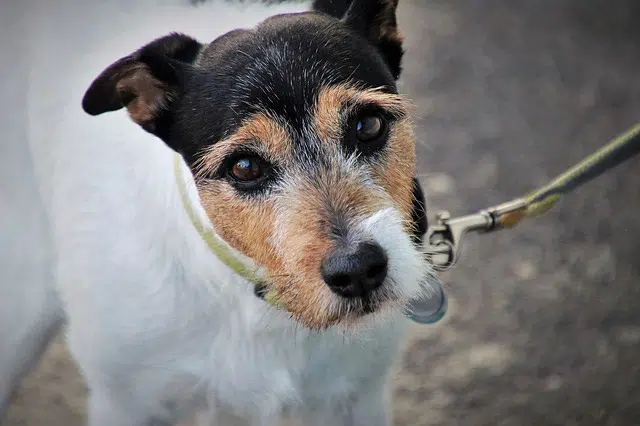
Reasons that fit into this category include:
Anxiety
Anxiety is a common cause of numerous unpleasant symptoms that visit dogs from time to time.
Not only is anxiety in dogs difficult to treat, it can also be hard to diagnose if you don’t know the signs and symptoms for which to watch.
When dogs become anxious or overly worried, the condition can lead to behaviors like chewing, urinating indoors, hiding from strangers, and incessant barking.
And yes, when you question your dog—when you call your dog onto the carpet to answer for these misbehaviors—you just might find a quivering bottom jaw awaiting you.
Dogs also exhibit separation anxiety, which can also cause a quivering jaw.
For instance, if your dog notices that you are preparing to leave the house, perhaps on your way to work, your pooch is likely to act out in an attempt to get your attention.
This anxiety becomes so built-up and all-consuming, resulting in physical manifestations of the anxiety, including a shivering lower jaw.
If you feel your beloved pet is suffering from any form of anxiety, it’s important to have him examined and diagnosed by your vet, who may prescribe medications to manage the uncomfortable symptoms.
Trainers, too, can work with dogs to minimize their anxious state of mind, and replace it with a much calmer and confident bearing.
In a State of Glee
This cause, glee or utter happiness, goes back to the example we provided at the onset of this section.
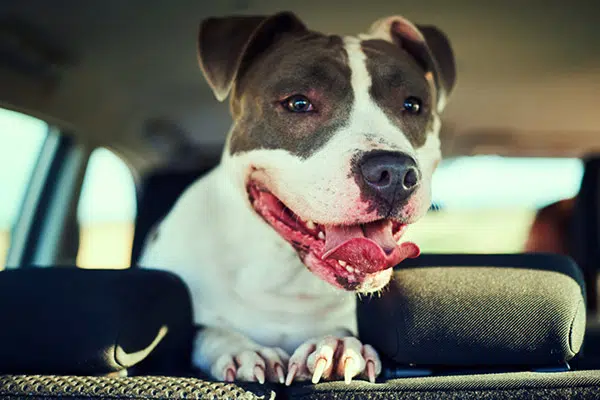
Often, a dog’s lower jaw may quiver when he is in a state of glee or excitement—when something is about to happen that will gleefully interrupt the normal day-to-day “blahs.”
You may notice this behavior right before walks or when preparing for trips to the dog park; just prior to feeding time; when he is in the car riding with you; or even when he is simply playing tug-of-war with you using an old chew toy as the rope.
When happiness, excitement and fun times manifest themselves into a quivering bottom jaw in dogs, obviously there is nothing you need to do (except plan even more fun outings for you and your four-legged pal).
As a Distraction
In the world of wild canines, including wolves, coyotes and even foxes, a quivering lower jaw is often a form of distraction, used primarily when the animal feels threatened.
Zoologists call this technique “displacement language,” and it is actually rather effective at achieving its aims.
If a canine species in the wild feels eminent danger from a bigger and more deadly predator, the canine may begin to act in a weird or bizarre manner—to do something that is completely out of the ordinary.
This displacement language can also include a quivering lower jaw.

As the predator focuses on this bizarre shaking and shivering, he may just lose interest in finding his next meal, giving the canine his chance to escape.
Most dogs that are house pets rarely have encounters with large predators, but they are in constant communication with us—their owners.
Therefore, if they see we are mad about something—say the dog had gotten into the trash—they may try out this tactic to see if they can sway us.
Unfortunately for dogs, the human species is much more evolved and tends to hold grudges much longer than other animals.
It’s Cold Outside
Perhaps we should have put this particular cause of lower jaw shivering, (low temperatures) at the top of this article, because it is by far the number one reason for the behavior.
Dogs can shake and quiver all over when the temperatures drop, but it is seen most often in the jaw.
Smaller dogs, especially those with short, wiry hair, can be particularly susceptible to the cold, which is why sweaters or some type of covering is recommended for these dogs (think chihuahuas) outdoors, especially when the mercury in the thermometer begins to plunge.
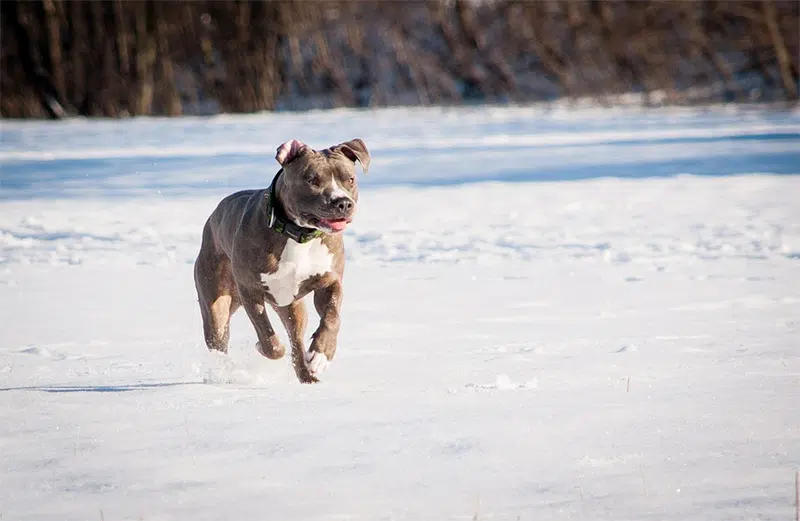
So just how do you stop this bottom jaw quivering in your dog when it is cold outside?
First, start by bringing them indoors.
If your dog is wet or shivering, use towels to dry him off and a blanket to help raise the core temperature.
Complete these steps, and in no time at all your dog’s jaw will be completely back to normal.
Medical Reasons for a Quivering Jaw in Dogs
Most instances of lower jaw quivering in dogs is caused by some behavioral factor (anxiety, excitement, fear); or by an environmental influence, such as when it gets really, really cold outside.
This is why we are spending less time and ink on the medical causes of “jaw quiver,” although we admit there are some very serious conditions that can result in this odd behavior, and those conditions will typically produce other troublesome symptoms as well.
So without further fanfare, here are the potential medical reasons for a quivering bottom jaw in dogs:
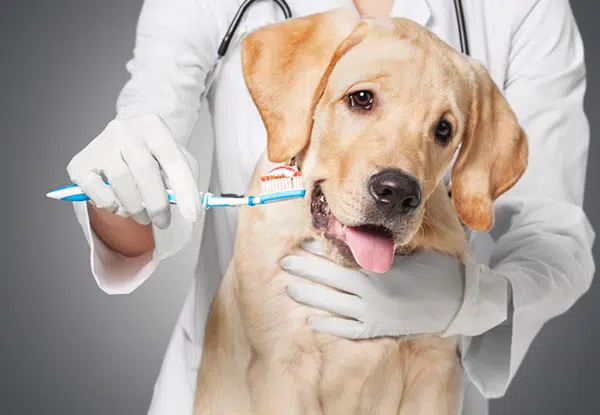
- Dental problems. As of this writing, I am only twenty minutes removed from a tooth extraction, and I can say with confidence and experience that sometimes a dental problem can make you shake and quiver. Sadly, dogs cannot voice their tooth or gum pain, so they do the next best thing: quiver.
- Seizure. Seizures in dogs are rare, but they can happen, especially in older dogs. These seizures can vary in severity and duration, and they can cause the type of quivering we are speaking about here. Typically, there will be other symptoms that accompany a seizure, such as fatigue, listlessness and loss of appetite. If you suspect your dog has had a seizure, it’s important that you get him to the vet immediately.
- Toxins. Dogs can get into all sorts of poisons and toxins if allowed to move freely through your yard, garage or shop; and ingestion of these poisons can cause a wide array of out-of-the-ordinary signs and symptoms. Always keep potential toxins outside your dog’s reach, and call your vet immediately if you suspect an accidental poisoning.
As you can see, there are a variety of medical and non-medical circumstances that could lead to lower jaw quivering in dogs.
There is also one final cause we have yet to mention—a cause that fits neatly into every category cited here—behavioral, environmental and medical.

This cause is old age.
Just as we humans tend to shake involuntarily sometimes as we age, so ,too, do our beloved pets.
Therefore, if your dog is 11-12 years of age or older, the quivering you sometimes notice might just be a natural and expected sign of a life well lived.

Thank you for helping in somewhat. This is the first time owning a Maltese dog she’s 6 going on 7 years old. Never experienced this situation. She does the licking ,and quivering. When she rides she either locks the window or pants like she’s always hot. So if you can help it would be appreciated.